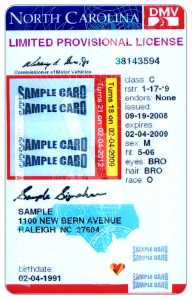Revocation of Drivers Licenses for Under Age Persons Violating Alcoholic Beverage Regulations
Wednesday, February 22nd, 2012 North Carolina Laws require the NC Division of Motor Vehicles to revoke an underage person’s license as required by G.S. 20-17.3 for violating various provisions of the alcoholic beverage regulations including aiding and abetting and attempting to violate certain regulations. However, there are ways to legally avoid the revocation of your license if you are accused of violating these regulations. Call Collins Law Firm for a consultation if you have any questions or need legal representation at: 910-793-9000.
North Carolina Laws require the NC Division of Motor Vehicles to revoke an underage person’s license as required by G.S. 20-17.3 for violating various provisions of the alcoholic beverage regulations including aiding and abetting and attempting to violate certain regulations. However, there are ways to legally avoid the revocation of your license if you are accused of violating these regulations. Call Collins Law Firm for a consultation if you have any questions or need legal representation at: 910-793-9000.
Selected relevant statutes include:
North Carolina Statutes, Chapter 20. Motor Vehicles, § 20-17.3. Revocation for underage purchasers of alcohol
The Division shall revoke for one year the driver’s license of any person who has been convicted of violating any of the following: (1) G.S. 18B-302(c), (e), or (f): (2) G.S. 18B-302(b), if the violation occurred while the person was purchasing or attempting to purchase an alcoholic beverage; (3) G.S. 18B-302(a1).
If the person’s license is currently suspended or revoked, then the revocation under this section shall begin at the termination of that revocation. A person whose license is revoked under this section for a violation of G.S. 18B-302(a1) or G.S. 18B-302(c) shall be eligible for a limited driving privilege under G.S. 20-179.3.
North Carolina Statutes, Chapter 18B. Regulation of Alcoholic Beverages, Article 3. Sale, Possession, and Consumption, 18B-302. Sale to or purchase by underage persons
(a) Sale. – It shall be unlawful for any person to: (1) Sell malt beverages or unfortified wine to anyone less than 21 years old; or (2) Sell fortified wine, spirituous liquor, or mixed beverages to anyone less than 21 years old.
(a1) Give. – It shall be unlawful for any person to: (1) Give malt beverages or unfortified wine to anyone less than 21 years old; or (2) Give fortified wine, spirituous liquor, or mixed beverages to anyone less than 21 years old.
(b) Purchase, Possession, or Consumption. – It shall be unlawful for: (1) A person less than 21 years old to purchase, to attempt to purchase, or to possess malt beverages or unfortified wine; or (2) A person less than 21 years old to purchase, to attempt to purchase, or to possess fortified wine, spirituous liquor, or mixed beverages; or (3) A person less than 21 years old to consume any alcoholic beverage.
(c) Aider and Abettor. (1) By Underage Person. – Any person who is under the lawful age to purchase and who aids or abets another in violation of subsection (a), (a1), or (b) of this section shall be guilty of a Class 2 misdemeanor. (2) By Person over Lawful Age. – Any person who is over the lawful age to purchase and who aids or abets another in violation of subsection (a), (a1), or (b) of this section shall be guilty of a Class 1 misdemeanor.
(d) Defense. – It shall be a defense to a violation of subsection (a) of this section if the seller: (1) Shows that the purchaser produced a driver’s license, a special identification card issued under G.S. 20-37.7, a military identification card, or a passport, showing his age to be at least the required age for purchase and bearing a physical description of the person named on the card reasonably describing the purchaser; or (2) Produces evidence of other facts that reasonably indicated at the time of sale that the purchaser was at least the required age. (3) Shows that at the time of purchase, the purchaser utilized a biometric identification system that demonstrated (i) the purchaser’s age to be at least the required age for the purchase and (ii) the purchaser had previously registered with the seller or seller’s agent a drivers license, a special identification card issued under G.S. 20-377.7, a military identification card, or a passport showing the purchaser’s date of birth and bearing a physical description of the person named on the document.
(e) Fraudulent Use of Identification. – It shall be unlawful for any person to enter or attempt to enter a place where alcoholic beverages are sold or consumed, or to obtain or attempt to obtain alcoholic beverages, or to obtain or attempt to obtain permission to purchase alcoholic beverages, in violation of subsection (b) of this section, by using or attempting to use any of the following: (1) A fraudulent or altered drivers license. (2) A fraudulent or altered identification document other than a drivers license.
(3) A drivers license issued to another person. (4) An identification document other than a drivers license issued to another person. (5) Any other form or means of identification that indicates or symbolizes that the person is not prohibited from purchasing or possessing alcoholic beverages under this section.
(f) Allowing Use of Identification. – It shall be unlawful for any person to permit the use of the person’s drivers license or any other form of identification of any kind issued or given to the person by any other person who violates or attempts to violate subsection (b) of this section.
(g) Conviction Report Sent to Division of Motor Vehicles. – The court shall file a conviction report with the Division of Motor Vehicles indicating the name of the person convicted and any other information requested by the Division if the person is convicted of any of the following: (1) A violation of subsection (e) or (f) of this section. (2) A violation of subsection (c) of this section. (3) A violation of subsection (b) of this section, if the violation occurred while the person was purchasing or attempting to purchase an alcoholic beverage. (4) A violation of subsection (a1) of this section. Upon receipt of a conviction report, the Division shall revoke the person’s license as required by G.S. 20-17.3.
(h) Handling in Course of Employment. – Nothing in this section shall be construed to prohibit an underage person from selling, transporting, possessing or dispensing alcoholic beverages in the course of employment, if the employment of the person for that purpose is lawful under applicable youth employment statutes and Commission rules.
(i) Purchase, Possession, or Consumption by 19 or 20-Year Old. – A violation of subdivision (b)(1) or (b)(3) of this section by a person who is 19 or 20 years old is a Class 3 misdemeanor.
(j) Notwithstanding any other provisions of law, a law enforcement officer may require any person the officer has probable cause to believe is under age 21 and has consumed alcohol to submit to an alcohol screening test using a device approved by the Department of Health and Human Services. The results of any screening device administered in accordance with the rules of the Department of Health and Human Services shall be admissible in any court or administrative proceeding. A refusal to submit to an alcohol screening test shall be admissible in any court or administrative proceeding.
(k) Notwithstanding the provisions in this section, it shall not be unlawful for a person less than 21 years old to consume unfortified wine or fortified wine during participation in an exempted activity under G.S. 18B-103(4), (8), or (11).

